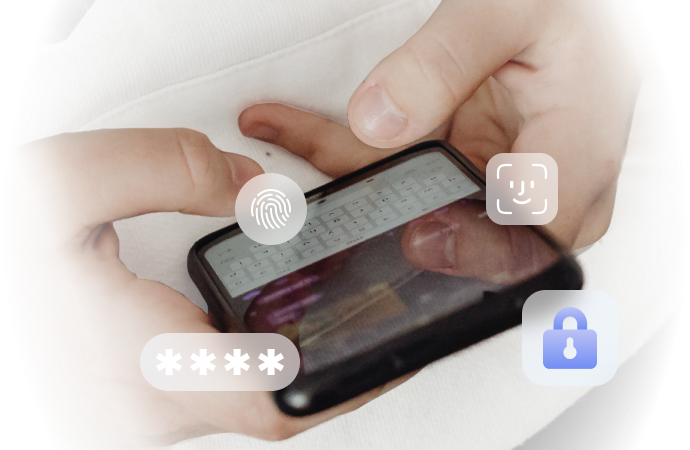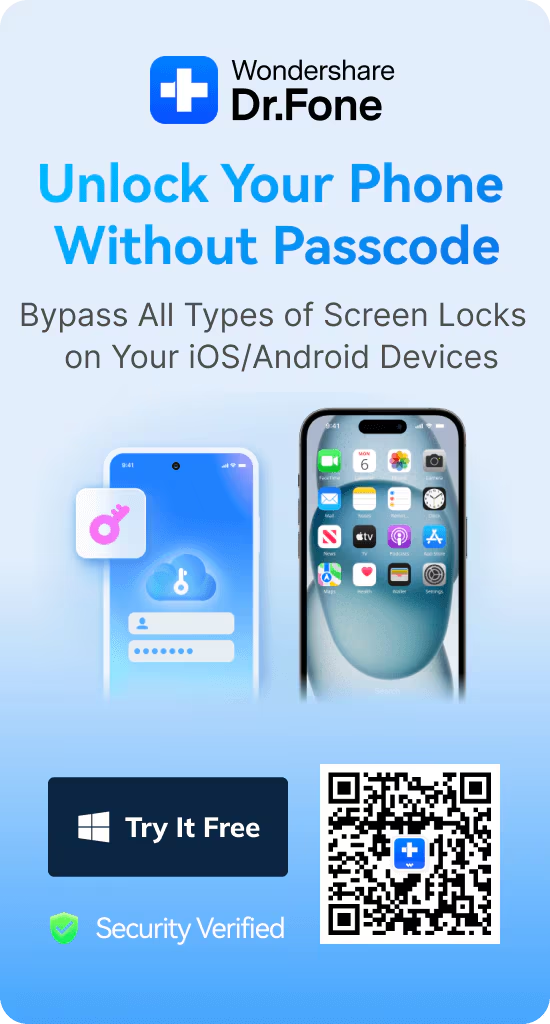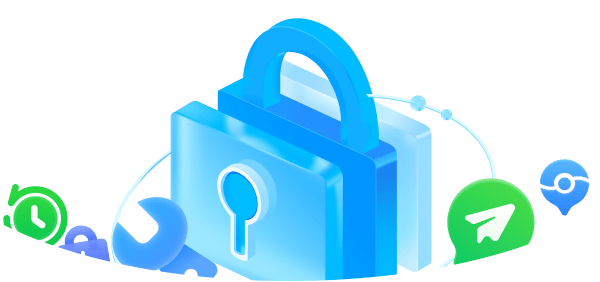
What You Want To Know About Two-Factor Authentication for iCloud
Jan 29, 2026 • Filed to: Screen Lock Removal • Proven solutions
In the past, hackers have stolen millions of iCloud credentials and demanded ransom from Apple. However, with the implementation of two-factor authentication, Apple has significantly enhanced the security of your Apple ID, reducing the risk of such attacks.
While two-factor authentication enhances iCloud security, there are times when you may need to bypass it. This guide will show you how to set up and bypass two-factor authentication on iCloud when necessary. Read on for step-by-step instructions.

- Part 1: What Is Two-Factor Authentication for iCloud?
- Part 2: What Are the Benefits of Two-Factor Authentication?
- Part 3: How To Set up Two-factor Authentication for iCloud?
- Part 4: How To Turn off Two-Factor Authentication on Your iPhone?
- Part 5: Is It Possible To Bypass Two-Factor Authentication for iCloud?
- Bonus Tips: Forgot Your iCloud Password? Here's What to Do
Part 1: What Is Two-Factor Authentication for iCloud?
Apple's two-factor authentication (2FA) offers enhanced security over the older two-step verification, using push notifications to protect your iCloud data. As security standards evolve, switching to 2FA is becoming essential. You can switch at any time, but adopting 2FA is crucial for safeguarding your data.

Part 2: What Are the Benefits of Two-Factor Authentication?
Two-factor authentication (2FA) adds an extra layer of security to your account, significantly reducing the risk of unauthorized access. By requiring more than just your username and password, 2FA helps protect your device from hackers.
Here are some of the benefits of activating two-factor authentication on your device.
- Improved security - A second form of identification aside from your password reduces the chance for someone to gain access to your information.
- Interconnectivity to mobile engagement - Two-factor authentication from businesses provides users with a stronger login system to ensure their information is safe in the digital world.
- Reduces Fraud - Due to the rise of identity theft in recent years, businesses risk losing trust, brand equity, and credibility. A secure authentication system adds a layer of protection to keep you secure.
404

Hot Tutorials
Part 3: How To Set up Two-factor Authentication for iCloud?
If you haven't set up two-factor authentication yet on your iCloud, here are the steps to activate it right now.
Step 1: On your iPhone/iPad, go to Settings and tap your Apple ID profile at the top.

Step 2: Tap Password & Security and turn On Two-Factor Authentication.
Step 3: Enter a phone number to receive the two-factor code via an SMS or a phone call.
Step 4: Enter the 6-digit verification code received on your device and wait for the process the finish.
Part 4: How To Turn Off Two-Factor Authentication on Your iPhone?
Once two-factor authentication is enabled on iCloud, you have a two-week window to deactivate it.
To get past two-factor authentication on iCloud, Go to Settings > your name > Password & Security. Tap Two-Factor Authentication and turn it Off again.
Meanwhile, here are the steps to learn how to bypass 2-step verification on iCloud on the web.
Step 1: Go to the Apple ID sign-in page and log in with your Apple ID.
Step 2: Click Sign-In and Security > Account Security.

Step 3: Click Turn Off Two-Step Verification. Answer a security question you've set up previously to finish the process.
Part 5: Is It Possible to Bypass Two-Factor Authentication for iCloud?
You can't bypass two-factor authentication on iCloud. However, if you don't have access to your trusted device, you can receive a verification code via SMS or automated call to prove ownership of your iCloud account. If this is impossible, you should request account recovery to regain access to your account. The easiest way to prevent this issue is by adding another phone number to your Apple ID so you'll always have a backup. Here's how.
Step 1: On your iPhone, go to Settings and tap on your Apple ID > Password & Security.
Step 2: Tap Edit and choose to Add a Trusted Phone Number. You'll have to enter your device's passcode to continue.

Step 3: Enter your new phone number. Select a way to receive a verification code via sms or phone call and tap Send.
Step 4: Enter the verification code and wait for the process to finish.
Bonus Tips: Forgot Your iCloud Password? Here's What To Do
Dr.Fone - iCloud Activation Unlocker is a powerful tool that helps bypass iCloud and screen locks on your iPhone. If you've forgotten your password or are locked out after restoring your device, this software provides an easy solution to regain access.
Dr.Fone - iCloud Activation Unlocker
How Dr.Fone's iCloud unlocker can bypass iCloud activation lock and solve your problems:
- Forgot your password and now your iPhone is iCloud locked?
- Purchased a pre-owned iPad, iPod Touch, or iPhone that's still owner-locked?
- Received a gifted iPhone, iPad, or iPod Touch that’s activation locked?
- Device got lost or stolen and needs to disable the iCloud activation lock?
Here's how to use Dr.Fone if you forget your iCloud password.
Obtain the latest version of Wondershare Dr.Fone - iCloud Activation Unlocker, install it on your computer, and then launch the application.

Click the Start button, to proceed to the Bypass iCloud Activation Lock screen. Then tap Start to begin bypassing the device's Activation Lock.

When using the corresponding feature, you'll be instructed to connect your iOS device to your computer via a USB cable. Upon connecting the device, the interface will show the connection status and guide you to the next step.

Before initiating the Activation Lock removal process, a confirmation prompt will appear on your screen. This prompt includes important details and warnings related to the Activation Lock removal procedure. Carefully review all the information provided, check the box I have read and agree the agreement to indicate that you have read and agree to the terms of the agreement, and then tap the Got It! button to proceed.

The Activation Lock removal process will automatically commence. The progress of this operation will be displayed in a progress bar, providing real-time updates on the status of the process.

Once the Activation Lock removal process is successfully completed, a completion message will be displayed in the window. At this stage, you can click the Done button to finalize the activation lock unlocking process.

Conclusion
Enabling two-factor authentication on your iCloud is essential for protecting your data from hacks and unauthorized access. If you've forgotten your iCloud credentials and struggle to recover your account, tools like Dr.Fone offer an easy solution to unlock your iOS device in just a few steps.
iCloud Manage
- iCloud Delete
- iCloud How-Tos
- 1. Get More iCloud storage
- 2. Save Documents in iCloud
- 3. Access iCloud Photos
- 4. Access Your Notes on iCloud
- 5. Cancel iCloud Storage Plans
- 6. Sharing iTunes Store Purchases
- 7. Reset iCloud Email on iPhone / PC
- 8. Set Up iCloud Account on Android
- 9. iCloud Two-Factor Authentication
- 10. See Pictures Stored in iCloud
- 11. Buy More iCloud Storage
- 12. See What Is In iCloud Storage
- iCloud Issues
- 1. iCloud Backup Failed Issue
- 2. Not Enough iCloud Storage
- 3. iCloud Contacts Not Syncing
- 4. iCloud Photos Not Syncing
- 5. iPhone Couldn't Be Activated
- 6. iPhone Backup with iTunes/iCloud
- 7. Stuck on Updating iCloud Settings
- 8. iPhone Won't Backup to iCloud
- 9. Notes App Not Syncing with iCloud
- 10. Syncing with iCloud Paused
- iCloud Tricks
- 1. iCloud Tips and Tricks
- 2. Recover iCloud Password
- 3. Disconnect iPhone from iCloud
- 4. Retrieve Contacts from iCloud
- 5. iCloud Alternative For iPhone/iPad
- 6. Bypass iCloud Activation with IMEI
- 7. Bypass Activation Lock on iPhone
- 8. Change iCloud Account on iPhone
- 9. Get Rid of the Repeated iCloud Sign
- 10. Download Videos from iCloud
- 11. iCloud Storage vs. iPhone Storage
- 12. Manage iCloud Storage on iPhone/iPad
- ● Manage/transfer/recover data
- ● Unlock screen/activate/FRP lock
- ● Fix most iOS and Android issues
- Manage Now Manage Now Manage Now



















James Davis
staff Editor